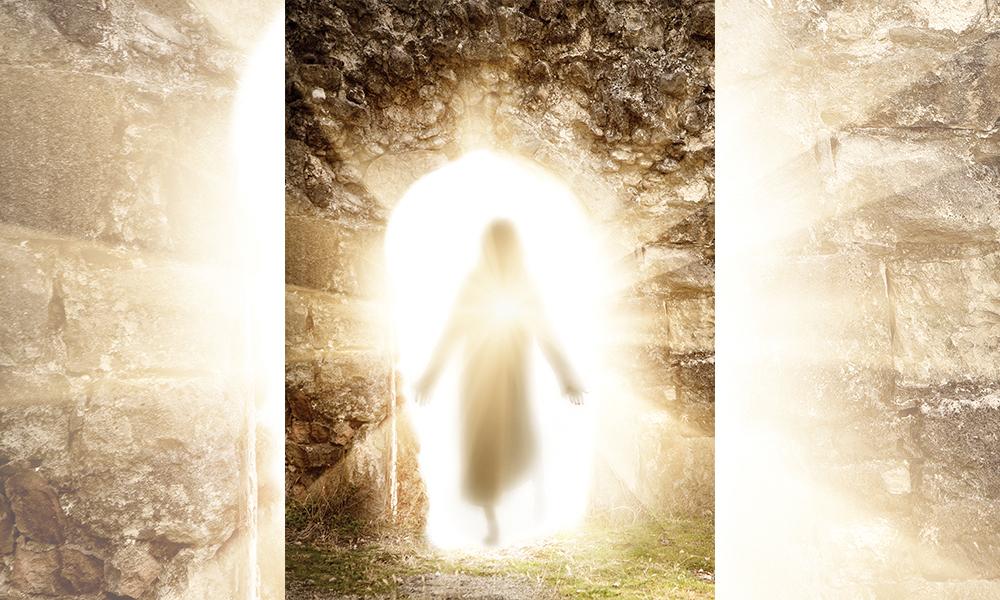
Faith in the Resurrection
As a writer, I appreciate St. Paul and his ability to write as beautifully as he did.
He could be poetic:
“Love is patient; love is kind; It is not jealous, [love] is not pompous, it is not inflated. It is not rude, it does not seek its own interests, it is not quick-tempered; it does not brood over injury; it does not rejoice over wrongdoing but rejoices with the truth. It bears all things, believes all things, hopes all things, endures all things. Love never fails.“
He could be inspirational:
“Finally, brothers, whatever is true, whatever is honorable, whatever is just, whatever is pure, whatever is lovely, whatever is gracious, if there is any excellence and if there is anything worthy of praise, think about these things. ...
“I rejoice greatly in the Lord that now at last you revived your concern for me. You were, of course, concerned about me but lacked an opportunity. Not that I say this because of need, for I have learned, in whatever situation I find myself, to be self-sufficient. I know indeed how to live in humble circumstances.
“I know also how to live with abundance. In every circumstance and in all things, I have learned the secret of being well fed and of going hungry, of living in abundance and of being in need. I have the strength for everything through Him who empowers me.”
His words are especially relevant during Easter:
“But if Christ is preached as raised from the dead, how can some among you say there is no resurrection of the dead? If there is no resurrection of the dead, then neither has Christ been raised. And if Christ has not been raised, then empty [too] is our preaching; empty, too, your faith.”
Many people are quick to deny that which occurred. Some people deny the horrors of the Holocaust; some think the Apollo 11 moon landing never happened; some believe that the pandemic is a hoax.
The birth and death of one particular man more than 2,000 years ago is a tricky subject. There was no television or radio. There was no internet. We don’t have the kind of proof that would exist today if a man named Jesus walked the earth. In today’s media-obsessed world, people would document and air/share what He said and did.
But, without concrete proof, it makes many of us wonder: Was there really a man named Jesus who was crucified? History says yes. Did He claim to be the Son of God? Yes. Did He perform miracles? Eyewitnesses said yes. Was He raised from the dead? The Bible says yes.
The focus then shifts, the burden of proof hinging on Jesus’ resurrection.
Anyone can claim to be the Messiah. But can just anyone be killed — and then three days later appear again to others in the walking/talking fashion that He did? Obviously, nothing is impossible for God, and so the answer is, no human can be killed and then appear in the flesh three days later.
But the Son of God can.
When I look around and see so much beauty around me — the wind causing wisps of clouds to shape-shift across the blue sky; the softness of my dog’s golden-brown fur; my wife’s perfect smile; a little child laughing while skipping across the wet pavement of a school parking lot — I realize that everything in life is a miracle, a gift created and shared by Someone who loves us.
To acknowledge those miracles — which is another way of saying that God exists — is to acknowledge what St. Paul meant when he said that we “walk by faith, not by sight.”
One of my favorite definitions of faith comes from Pope Emeritus Benedict XVI, who once wrote the following:
“Faith makes possible authentic knowledge about God, which involves the whole human person: it is ... a knowledge which gives life a savor, a new taste, a joyful way of being in the world. Faith is expressed in the gift of self for others, in brotherhood which creates solidarity, the ability to love, overcoming the loneliness that brings sadness. Thus, this knowledge of God through faith is not only intellectual but also vital. It is the knowledge of God-Love, thanks to His own love. The love of God, moreover, makes us see, opens our eyes, enables us to know the whole of reality, in addition to the narrow views of individualism and subjectivism that confuse consciences. Knowledge of God is therefore an experience of faith and at the same time entails an intellectual and moral development; moved in our depths by the Spirit of Jesus within us, we go beyond the horizons of our own selfishness and open ourselves to the true values of existence.”
To have faith is to realize that God sent His Son on a mission, and this mission was a powerful display of what an obedient and trusting relationship with the Father looks like; it was also a vivid example of love and forgiveness in action. To have faith is to realize that, through His death, resurrection and ascension into heaven, Christ proved He is our savior.
In return, we have the free will to either accept this reality, through the grace of faith, or reject it. If we accept it, it means carving out the time and silence to get to know Christ — through prayer, through reading and studying Scriptures, through participating in the sacraments and through loving, merciful actions toward others.
It is only through those actions that the following words written by St. Augustine come alive in our hearts: “Understanding is the reward of faith. Therefore, seek not to understand that you may believe, but believe that you may under-stand.”
In an inspired homily during an Easter Sunday Mass many years ago, Archbishop Fulton Sheen posed several questions:
“The cross had asked the questions,” he said. “The resurrection had answered them. The cross had asked the question: How far can power go in the world? The resurrection answered: Power ends in its own destruction, for those who slew the foe lost the day.
“The cross had asked: Why does God permit evil and sin to nail Justice to a tree? The resurrection answered: That sin, having done its worst, might exhaust itself and thus be overcome by Love that is stronger than either sin or death.
“Thus, there emerges the Easter lesson that the power of evil and the chaos of any one moment can be defied and conquered, for the basis of our hope is not in any construct of human power, but in the power of God Who has given to the evil of this earth its one mortal wound — an open tomb, a gaping sepulcher, an empty grave.”
This open tomb signifies that nothing is impossible because, with faith in God, everything is possible, including the fact that all of humanity, scared and scarred by sin, has the opportunity to be redeemed, if only we turn to the Lord, our Savior, with humility, gratitude, faith and repentance.
We no longer need to be afraid of sin or death, which is why Easter is a time of great joy. St. Paul puts it this way: “ ‘Death is swallowed up in victory. Where, O death, is your victory? Where, O death, is your sting?’ ... Therefore, my beloved... be firm, steadfast, always fully devoted to the work of the Lord, knowing that in the Lord your labor is not in vain.”
Happy Easter, everyone, for Christ is risen.
Hallelujah! Christ is truly risen.



